Full coverage of the worst refugee crisis to hit Europe since the second world war, as thousands of refugees arrive in Germany
- Nicola Sturgeon and Yvette Cooper offer to house Syrian refugees
- George Osborne to divert foreign aid to help Syrian refugees in UK
- Refugee crisis: eight life stories from Budapest’s Keleti station
Afternoon summary
Here’s a round up of the main events on Sunday as the migration crisis continues to unfold:
- A fundamental review of Britain’s £9bn aid budget will be used to fund Syrian refugees for their first year in the UK and to support Syria’s neighbours hosting camps, George Osborne has said.
- Germany is not asking how many refugees it can afford to shelter, but how it can make the new arrivals feel safe at last, the mayor of Munich said as the city prepared to register thousands of people on Sunday.
- Volunteers and donors for refugees condemned government’s response at charity event in east London.
- Nicola Sturgeon and Yvette Cooper have indicated that they would be prepared to house Syrian refugees as the Scottish government and Labour party intensified pressure on David Cameron to act generously.
- The chancellor, George Osborne, announced that the government would use funds from the UK’s £12bn annual overseas aid budget to help local authorities cover the costs of housing refugees. Guardian reporter provides this analysis of how the UK will pay for refugees the government has pledged to take.
- David Cameron is facing growing pressure to extend RAF air strikes into Syria as the worsening conflict threatened to drive increasing numbers of desperate refugees to seek sanctuary in Europe. The former Archbishop of Canterbury Lord Carey became the latest senior figure to call for a renewed military effort to “crush” Islamic State in its Syrian heartlands.
Violent clashes between riot police and refugees in Greece
The situation has become increasingly explosive on Lesvos, Greece, one of the islands on the frontline of the crisis, as running battles escalate between riot police and refugees desperate to board boats for Athens, our correspondent Helena Smith reports.
Greece’s migration minister Ioannis Mouzalas has rushed to Lesvos after a second day of street fighting on the Aegean isle. Scenes of stone-pelting refugees engaged in hand-to-hand battle with local police has prompted the government to step up security with two extra units of riot police being dispatched to the island earlier today. Amid renewed violence local officials processing newcomers this morning locked themselves in a container as refugees, once again, vented their anger over delays in registration. On Saturday police resorted to using tear gas and stun grenades as around 500 Afghans attempted to seize and board a ferry heading to Athens. At least four were injured, one seriously.
With an estimated 13,000 migrants and refugees on the island – and hundreds arriving every day – the local mayor, Spyros Galanos, described the situation as being “out of control.”“There is a danger that a spark could trigger a big fire,” he said in a television interview adding that “a state of emergency” should be called on the island. “I have tabled proposals, I even called on mayors in Turkey and Europe and tabled proposals, but no one is listening.”Galanos said he hoped the migration minister’s visit – which coincided with Athens’ caretaker government also sending in extra coast guard officials and other experts to expedite the processing of refugees - would de-escalate tensions. “We are expecting some commitments [from the government] so that we will see how we can handle the situation,” he told the news portal, newsit.gr.
Racheting up the pressure, the mayor took the unprecedented step of urging islanders to boycott upcoming general elections on 20 September. He said local authorities would refuse to set up ballot boxes at polling stations “if measures aren’t taken immediately to defuse the situation.”The country, facing its worst economic crisis in modern times, has announced it needs more than 1 billion euros to deal with the refugee crisis.In a good-will gesture Germany said over the weekend it would double humanitarian aid destined for Greece, dispatching an extra 2.4 million euros’ worth of relief through the Red Cross and UN agency for refugees, the UNHCR.
Germany is not asking how many people it can afford to shelter, but how it can make thousands of refugees feel safe at last, the mayor of Munich said as the town prepared to register thousands of new arrivals on Sunday, Emma Graham-Harrison reports.The city expects to receive around 10,000 people over this one weekend alone. The new arrivals were greeted by cheering crowds handing out toys and chocolate as they filed off trains and into tents for basic medical checks.They are then bussed away to conference centres, school halls and other large spaces that have been pressed into service as temporary housing centres, part of a complex system for handling the flood of migrants that was set up almost overnight.Mayor Dieter Reiter said his own city had surprised him by how effectively it had responded to the crisis, and was“Of course there are some limits responding given the space we have in Munich but that is not the question I am asking myself,” Reiter told journalists after a news conference.“Every day I am asking myself how can we accommodate these people, these refugees, how can we give them a feeling that they are safe here in Munich, here in Germany. I am not really thinking about how many people can we afford and can we take here in Munich. That is not the question.”On Saturday 6,780 people arrived in Munich on trains, many of them from the large group that had set off to walk from Budapest to Austria after days stranded at a train station in the Hungarian capital. After a long day’s march, most were picked up by busses and taken to the border, but many arrived exhausted and sick.Perhaps the most critical new arrival was a baby born prematurely on the concourse at Keleti station, on Tuesday,” said Stephanie Jacobs, health minister in the local government.She arrived with her umbilical cord still attached, and needed urgent medical care. “She is now in an incubator, and doing well given the circumstances,” Jacobs said.
The city is expecting another 4,000 to arrive on Sunday. The first 1,200 came in the early hours of the morning, but their trains were diverted straight away to other German cities, including Frankfurt, to ease the pressure on Munich.
Men, women and children who have recently crossed the border into Hungary from Serbia are escorted to a new transit camp near the town of Röszke on Sunday.
Regional newspapers and websites are reporting on the activities and actions of people supporting refugees across the country.
A demonstration against the Government’s stance on refugees in Oxford is expected to attract more than 1,500 people, the Oxford Mail reports. The Refugees Welcome protest outside the Sheldonian Theatre from 3pm will see Oxford residents call on the Government take greater humanitarian responsibility for the crisis.
A similar event took place in Cambridge on Saturday as hundreds took to the streets to offer support, the Cambridge News says. An estimated 300 people joined the demo on Market Square, which started at King’s Parade and marched up to the steps of the Guildhall.
In Cornwall, the Cornish Guardian reports that the Bishop of Truro has added his voice to calls for Britain to do more to help people fleeing war-torn Syria. The Rt Rev Tim Thornton said he thought Britain had been “caught on the back foot” but that public opinion was now leading policy development, after Prime Minister David Cameron promised the UK would take “thousands” of refugees.
The Shropshire Star has a story about a mother who, moved by the harrowing photo of dead toddler Aylun Kurdi being pulled from the surf in Turkey, launched an appeal to buy life jackets for refugees. Joanna Seabright, from Radbrook Green, Shrewsbury, set up a crowd-funding page and hopes to raise thousands of pounds to buy life jackets for those who are making the dangerous journey.
Musician and campaigner Bob Geldof pledges to accept four refugee families into his Kent and London homes ‘until they can get a purchase on the future’.
Chief political correspondent Nicholas Watt has looked at suggestions Nicola Sturgeon and Yvette Cooper have indicated that they would be prepared to house Syrian refugees. He writes:
Sturgeon told the Murnaghan Programme on Sky News that she would be “absolutely happy” to take a refugee from Syria. This raised the prospect that a refugee could be housed in Bute House, the 18th-century Edinburgh townhouse that serves as the official residence of the Scottish first minister.Cooper also told Sky News she and her husband, Ed Balls, would be prepared to accept a refugee.
Guardian reporter Sam Jones has taken a look at how the UK will pay for refugees government it has pledged to take.
More than 2,000 Britons offer to house refugees
More than 2,000 people have offered to house refugees in their own homes as ordinary Britons lead the way in responding to the refugee crisis, the Press Association reports.
Zoe Fritz, who has set up an online database of people willing to give a bed to those fleeing conflict and persecution, said she has been moved to tears by the flood of responses.
Dr Fritz, 39, who works as a consultant at Cambridge University Hospital, said she set up the initiative after seeing shocking images of the wave of refugees risking their lives to come to Europe.

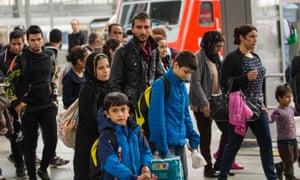
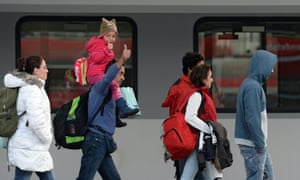

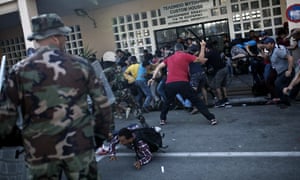

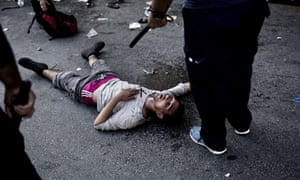
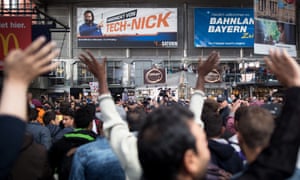

No comments:
Post a Comment